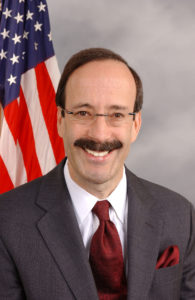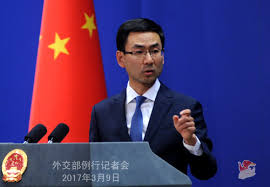The cause of Tibetan, Uighurs and Hong Kongers’ freedom has found policy support in the form of parliamentary discussions and legislation in the United States. Other countries, including Canada, are also echoing vocal expressions of support.

US House Committee Chairman Eliot Engel
In a recent development, the Tibetan Policy and Support Act (TPSA) was unanimously passed by the US House Foreign Affairs Committee on December 18. The Act provides for various measures to safeguard the interests of the Tibetan community and its faith. It seeks to establish a US policy that mandates that the selection of Tibetan religious leaders will be done by Tibetans, with no interference or influence from the Chinese Government. It calls out the Chinese authorities on their unjust infringement over the community, as expressed by US House Committee Chairman Eliot Engel, “It is an unthinkable violation of the basic principles of religious freedom that the Chinese government will choose the religious leaders of the Tibetan people rather than allowing the Tibetan people to make this decision through their ancient and sacred tradition.”
The Act involves sanctions that will prevent Chinese officials from making a selection of the successors to the Dalai Lama, the Tibetan spiritual leader in exile. In addition to preventing China from meddling with the affairs of the spiritual leadership, the Act also establishes grounds for opening a US consulate in Lhasa, Tibet’s capital. Until that happens, no new Chinese consulate shall be allowed to be opened in the United States. The legislation is an upgrade and an update of the landmark Tibetan Policy Act of 2002 and extends its arms to encompass policies on water security and climate change in Tibet. The Act also directs funding for humanitarian projects serving Tibetan welfare until at least 2025.
Uighur Act of 2019
Concomitant to these developments, the US has also passed similar legislation to safeguard the rights of the Uighurs, who are a Muslim minority community living in East Turkestan in north-western China and are being subjected to human rights violations similar to those endured by Tibetans in Tibet.
The Uighur Act, 2019 was also passed in the US House of Representatives as an expression of objection to China’s “arbitrary detention, torture, and harassment” of the Uighur Muslims. This brings legislative support to a community that has been subject to arbitrary arrests and imprisonment by requiring the US President to condemn this violation of international human rights. The bill also seeks the closure of the detention camps that currently hold over 1,000,000 Uighurs: these are essentially prison camps which Beijing describes as “vocational training centres”. The bill is awaiting approval by the United States Senate.
International support
 It has also been widely acknowledged that the human rights violations taking place in Tibet have been aggravated with time. Tibetan-Canadian Member of Provincial Parliament Bhutila Karpoche, the first Tibetan in North America to be elected to public office, brought attention to the issue in the Legislative Assembly of Ontario on December 10. She implored Canadians to support the violated communities – the Tibetans, Uyghurs and Hong Kongers – as they seek to resolve the ongoing conflicts and pursue independence from Chinese powers.
It has also been widely acknowledged that the human rights violations taking place in Tibet have been aggravated with time. Tibetan-Canadian Member of Provincial Parliament Bhutila Karpoche, the first Tibetan in North America to be elected to public office, brought attention to the issue in the Legislative Assembly of Ontario on December 10. She implored Canadians to support the violated communities – the Tibetans, Uyghurs and Hong Kongers – as they seek to resolve the ongoing conflicts and pursue independence from Chinese powers.
And in Washington DC, a number of prominent Chinese scholars and leaders signed a joint statement rejecting the Chinese Government’s claims of authority regarding the recognition of the reincarnation of the next Dalai Lama, stating that this is the right of the Tibetan People, and supporting the MiddleWay Policy. The statement was issued at the New York Sino –Tibet Dialogue – 2019 held by the Office of Tibet, Washington DC.
China’s response to the developments
 After the Tibetan Policy and Support Act of 2019 was passed, China has expressed anger and resentment. China’s Foreign Ministry Spokesperson Geng Shuang has dismissed any foreign interference, claiming that Tibetan affairs are China’s internal affairs and that the Act seeks to exploit the issue of Tibet to make way for further interference in China’s domestic policy affairs. Citing the massive sensitivity of the Tibet issue, Chinese officials have claimed that the Act sends a wrong signal to the “Tibet independence” forces.
After the Tibetan Policy and Support Act of 2019 was passed, China has expressed anger and resentment. China’s Foreign Ministry Spokesperson Geng Shuang has dismissed any foreign interference, claiming that Tibetan affairs are China’s internal affairs and that the Act seeks to exploit the issue of Tibet to make way for further interference in China’s domestic policy affairs. Citing the massive sensitivity of the Tibet issue, Chinese officials have claimed that the Act sends a wrong signal to the “Tibet independence” forces.
 Reportedly, Li Haidong, a professor at the China Foreign Affairs University’s Institute of International Relations in Beijing, has expressed concerns that the series of bills related to Tibet and to “China’s Hong Kong, Taiwan and Xinjiang” are effectively moves to contain China.
Reportedly, Li Haidong, a professor at the China Foreign Affairs University’s Institute of International Relations in Beijing, has expressed concerns that the series of bills related to Tibet and to “China’s Hong Kong, Taiwan and Xinjiang” are effectively moves to contain China.
It, however, seems unlikely that China’s narrative and accusation of these legislations being negative and detrimental will have any weight – most candidates of the United States 2020 Presidential elections have condemned the Chinese crackdown, with South Bend Mayor Pete Buttigieg willing to resort to “diplomatic and economic isolation” of the nation. Human rights issues are on the candidates’ agendas, the spirit of which maintains their allegiance to action against China’s expansionist intentions.




 Print
Print Email
Email